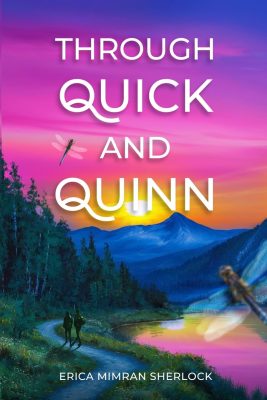What would it be like to discover two connected galaxies that The Big Bang theory says are impossible?
Not many people have even imagined facing this question, but in The Falling Sky Pippa Goldschmidt takes readers into the mind of an astronomer who not only observes the connected galaxies but can’t find anything wrong with her own work—no matter how hard she tries to refute her findings.
This conundrum creates a human drama as fraught with turmoil and heartache as any found in the best novels of any genre.
Only half of Goldschmidt’s novel is about astronomy, however. The chapter titles alternate between “Now,” in which Jeanette is a young scientist, and “Then,” which focus on her early childhood. Reflections on “Then” are also woven into the fabric of chapters on “Now,” so the reader can understand how Jeanette’s tragic and disturbing childhood has shaped her ambivalent present. This, by the way, is not a story of childhood sexual abuse. Nor does it in any obvious way tie her early childhood experiences to her present sexuality, although I’m sure some readers will find connections.
In an exquisite scene on a Chilean mountaintop in the first “Now” chapter, Jeanette escapes the windowless control room of the telescope to gaze at the night sky the way she did as a child.
“She quickly gets her sea legs as she navigates her way from the jewels of the Southern Cross to the fragile puff of the Large Magellanic Cloud, and on to the crowded centre of the Milky Way. There is a rhythm involved in moving from star to star that she can match to her breathing, so at the peak of each breath she arrives at a star and then swings herself onto the next one, spanning the darkness.”
A paleontologist who finds a fossil inconsistent with the theory of evolution and a climate scientist who discovers a declining temperature trend contrary to global warming are in exactly the same predicament. The controversies surrounding “negative results” in science should make serious readers want to experience the thoughts and feelings of a realistic scientist confronted with a discovery that doesn’t fit the explanation accepted by nearly all trained scientists in their field.
For readers who aren’t scientists, the most important feature of this part of the story, and the most surprising to many, will be the doubt, even disbelief, that follows such a discovery. Back in Edinburgh, Jeanette tackles head on the possible reasons why her observation might have some explanation that is completely consistent with the Big Bang. The average person may even find Jeanette’s tenacious refusal to accept her own painstaking work pathologically perverse. Experienced scientists, however, will empathize completely.
And when Jeanette finally decides to publish her finding, hoping someone else will figure out what’s wrong, the reader sees from the inside what it is like to defend research that is inconsistent with a major theory. Her personal stakes are high because her reputation is sure to be questioned. Her job and long-term future could be on the line, too. Several nicely described scenes of in-house seminars and conference papers add weight to the readers’ understanding of Jeanette’s skepticism and her ambivalence about publishing the observation.
There’s a risk that this review will lead some readers to think The Falling Sky is a cautionary tale about how scientists who deviate from orthodoxy are punished by the scientific establishment. Goldschmidt will quickly disabuse them of this popular misconception.
Jeanette, the protagonist, is very much part of the scientific establishment and fiercely committed to its standards, goals and theories. She wants exactly what her colleagues want: more evidence and evidence from different lines of investigation. The latter is nicely embodied in a space telescope project going on in Edinburgh, as well as a lovely subplot involving a galaxy survey. In these details, Jeanette perfectly embodies how almost every young scientist would behave.
In an important scene Jeanette is pushed into a television appearance that quickly turns into a nightmare that will ring true for any scientist interviewed by the media. Two television “celebrities” misunderstand and ridicule her, and then, ignoring all the qualifications of careful science, they insist on the simpleminded conclusion that one negative finding demolishes a theory that explains tens of thousands of equally careful observations.
The Falling Sky resolves some of Jeanette’s personal conflicts but leaves the scientific mysteries open to further investigation. No other ending could be more appropriate and authentic. To say more about the story would give away the wonderful twists and turns of the plot. Lay readers and scientists alike will find Goldschmidt’s novel entertaining and discover in Jeanette a thoroughly captivating and charming person, one who will resonate in memory long after they have read the last page of the book.










The thought of another galaxy crossing paths with ours fires my imagination. It doesn’t have to be true to be a thrilling idea that I’m eager to read about. Chanticleer’s review convinced me that I should do so sooner rather later…”The Falling Sky” found its way through the cloud to my Kindle this morning.
Sandy in Bend